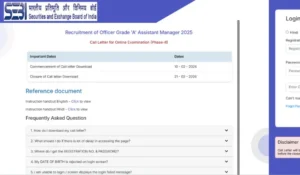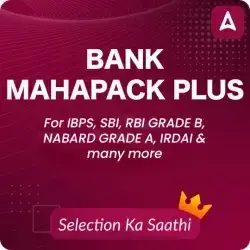Preparing for competitive bank exams like IBPS RRB, SBI PO/Clerk and RBI Grade B requires a well-planned strategy, focused study, and consistent practice. These exams test candidates on a range of subjects including reasoning, quantitative aptitude, general awareness, English and computer knowledge. To crack them, aspirants must go beyond basic studying and adopt smart techniques, proven shortcuts and concept-based learning. In this guide, we have compiled essential preparation tips, tricks, and notes to help candidates strengthen their preparation and improve their chances of success in these high-stakes exams.
Bank Exams Preparation Tips
Cracking bank exams requires focused preparation, solid planning and a solid understanding. In general, competition for the bank exams is relatively high, so this makes it a challenging task. In this article, we shall explore the right way to Prepare for the Bank Exams which will aid in your preparation and boost your chance of getting selection.
First of all, you need to set aside your casual attitude towards the bank or competitive examinations. Here is the Bank Exam Preparation Tips
- Understand the Exam Pattern & Syllabus
- Utilise Quality Study Material
- Focus on Conceptual Clarity
- Practice Regularly
- Stay updated with current affairs
- Develop Effective Time Management
- Analyze Mock Test Performance
- Maintain Physical and Mental Health
But before diving into the Bank Exam Preparation Tips, we should know the Bank Exams in India
- IBPS PO Exam: Conducted by the Institute of Banking Personnel Selection (IBPS) for the recruitment of Probationary Officers in various public sector banks.
- SBI PO Exam: Conducted by the State Bank of India (SBI) for the recruitment of Probationary Officers in SBI branches across the country.
- IBPS Clerk Exam: Conducted by IBPS for the recruitment of Clerical Cadre in public sector banks.
- SBI Clerk Exam: Conducted by SBI for the recruitment of Junior Associates (Clerical Cadre) in SBI branches.
- IBPS RRB Exam: Conducted by IBPS for the recruitment of Officers (Scale I, II, and III) and Office Assistants in Regional Rural Banks (RRBs).
- RBI Grade B Exam: Conducted by the Reserve Bank of India (RBI) for the recruitment of Grade B Officers in the RBI.
- RBI Assistant Exam: Conducted by the RBI for the recruitment of Assistants in its various branches.
- NABARD Grade A Exam: Conducted by the National Bank for Agriculture and Rural Development (NABARD) for the recruitment of Assistant Managers in Grade A.
- IBPS SO Exam: Conducted by IBPS for the recruitment of Specialist Officers in public sector banks.
- LIC AAO Exam: Conducted by the Life Insurance Corporation (LIC) for the recruitment of Assistant Administrative Officers (AAO) in LIC.
Understand the Exam Pattern & Syllabus
In the banking exam universe, candidates are recruited via a two or three-stage selection process. In general, clerk-level exams include Prelims and Mains Exams, while the PO-level exam includes an Interview. It’s crucial to understand the exam pattern.
- Preliminary Exam (Prelims): Subjects Covered: English Language, Quantitative Aptitude, and Reasoning Ability. To screen candidates for the Mains exam.
- Main Exam (Mains): Subjects Covered: English Language, Quantitative Aptitude, Reasoning Ability, General Awareness (with a focus on the banking sector), and Computer Knowledge. To assess in-depth knowledge and skills.
- Interview/Group Discussion: Conducted for PO and SO roles after clearing the Mains exam. To evaluate communication skills, personality, and banking awareness.
Bank Exam Preparation Tips & Tricks
Know the Syllabus Thoroughly
- Familiarise yourself with the complete syllabus for both Prelims and Mains.
- Prioritise topics based on their weightage in previous exams.
Create a Study Plan:
- Daily Routine: Allocate specific hours to each subject daily, ensuring balanced coverage.
- Weekly Targets: Set weekly targets to cover particular topics or sections.
- Revision Plan: Dedicate the last few weeks before the exam entirely to revision and practice.
Focus on Conceptual Clarity–
- Bank exams test your conceptual knowledge rather than rote memorisation. So it’s crucial to grasp core concepts thoroughly.
Focus on Weak Areas:
- Identify subjects or topics where you are weak and allocate more time to them.
- Use additional resources like tutorials, online courses, and study groups to strengthen these areas.
Practice Regularly–
- After conceptual clarity, there are three things, i.e. Practice, Practice & Practice.
- Solve as many questions from previous years’ questions and mock tests as possible. This will help in simulating the exam conditions and also in improving time management and accuracy levels.
Stay Updated on Current Affairs:
- Read newspapers, watch news channels, and follow Current Affairs websites to stay updated on banking, finance, and general events.
- Make notes of important events, particularly related to the banking sector.
Practice Mock Tests & Analyse-it Regularly:
- Take full-length mock tests under exam-like conditions to improve time management.
- Analyse your performance in each test to identify patterns in mistakes and work on them.
Learn Time Management:
- Develop strategies to manage time during the exam, such as solving easier questions first and revisiting tougher ones later.
- Practice sectional timing through mock tests.
Improve Speed and Accuracy:
- Practice regularly with speed tests, especially for Quantitative Aptitude and Reasoning.
- Work on shortcuts and tricks for quicker calculations.
Maintain Physical and Mental Health:
- Take care of your physical as well as Mental well-being. Ensure that you take regular breaks, do physical exercises, and maintain a balanced diet.
- Manage stress as well by practising meditation and yoga.
Cracking bank exams requires dedication, perseverance and a strategic approach. By following these tips and tricks, you can increase your chances of selection. Stay focused, believe in yourself and make efforts towards your dream of securing a rewarding career in the banking sector.
Subject Wise Study Preparation Tips for Bank Exams
English Language:
- Focus Areas: Vocabulary, grammar, reading comprehension, and verbal ability.
- Preparation Tips: Read newspapers and novels to enhance vocabulary and comprehension skills. Practice grammar exercises and solve previous years’ papers.
Quantitative Aptitude:
- Focus Areas: Number System (Simplification & Approximation), Arithmetic, Data Interpretation and Number Series.
- Preparation Tips: Memorise important formulas and shortcuts. Practice regularly with a focus on accuracy and speed.
Reasoning Ability:
- Focus Areas: Puzzles, seating arrangements, syllogisms, coding-decoding, and logical reasoning.
- Preparation Tips: Solve puzzles daily to enhance logical thinking. Practice the previous year’s questions and mock tests.
General Awareness:
- Focus Areas: Current affairs, banking awareness, financial news, and static GK.
- Preparation Tips: Regularly read newspapers and follow banking news. Make concise notes for revision.
Computer Knowledge:
- Focus Areas: Basic computer operations, MS Office, internet, and computer terminology.
- Preparation Tips: Familiarise yourself with basic computer concepts and practice with quizzes and sample papers.
Recommended Books for Bank Exams
Adda247 is a well-known platform for competitive exam preparation, particularly for banking exams. Their books are tailored to meet the specific needs of aspirants and cover a comprehensive range of topics. Here are some of the recommended books by Adda247 for bank exam preparation:
This book is designed to help candidates develop a strong foundation in Quantitative Aptitude. It covers:
- Basic to advanced level concepts
- Extensive practice questions
- Detailed solutions and shortcuts
- Previous years’ exam questions
2.
Reasoning Ability is a crucial section in bank exams, and this book covers:
- All types of reasoning questions (both verbal and non-verbal)
- Conceptual clarity with detailed explanations
- Practice sets and previous year questions
- Tips and tricks for quick problem-solving
3. Ace English Language for Banking and Insurance
To enhance English proficiency, this book offers:
- Comprehensive coverage of grammar and vocabulary
- Reading comprehension, para jumbles, cloze test, error spotting, etc.
- Practice exercises with solutions
- Previous years’ exam patterns and questions
4. Ace Banking and Static Awareness
General Awareness, especially related to the banking sector, is vital for mains exams. This book includes:
- Current banking and economic affairs
- Important banking terminologies and concepts
- Static GK relevant to banking exams
- Practice questions and quizzes
6. Ace Data Interpretation & Analysis
Data Interpretation is a significant part of bank exams, particularly in the mains stage. This book covers:
- Types of data interpretation questions (tables, bar graphs, line charts, etc.)
- Detailed solutions and approaches
- Practice sets with varying difficulty levels
- Strategies to solve complex DI problems
7. Banking Awareness by Adda247 Publications
For specific banking knowledge, this book offers:
- In-depth coverage of banking history, terms, and policies
- Important financial organizations and their roles
- Current banking news and updates
- Model papers for practice
Why Bank Exams Require a Smart Preparation Strategy
Bank exams such as IBPS RRB, SBI PO/Clerk, and RBI Grade B are among the most competitive recruitment processes in India, with lakhs of candidates appearing for limited vacancies each year. While the syllabus might appear manageable at first glance, the real challenge lies in the time-bound nature of the exam and the depth of application required in each section. This is why a smart preparation strategy is essential, not just to cover the syllabus, but to maximize performance in the actual exam setting.
Unlike academic exams, bank tests demand speed, accuracy, and strategy. Simply studying all topics is not enough; candidates need to know which topics to focus on, how to manage time, and how to prioritize sections based on their strengths. A well-thought-out approach includes section-wise preparation, regular mock tests, error analysis, and short notes for revision. Smart preparation ensures that candidates optimize their efforts, avoid burnout, and enter the exam hall with a clear game plan tailored to their strengths and weaknesses.
Selection Process for Bank Exams
The selection process for banking exams like Bank exams, i.e SBI Clerk, IBPS PO, IBPS Clerk, IBPS RRB, RBI and LIC generally consists of two or three stages.
Prelims Exam: The first stage is an objective test to assess basic skills in Reasoning, English, and Quantitative Aptitude.
Mains Exam: If you clear the prelims, you’ll take a more detailed and challenging mains exam.
Interview/Group Discussion: Some exams require a final round of Interview or Group Discussion, especially for positions like PO.
These stages are designed to test your knowledge, skills, and suitability for the job.
Common Mistakes to Avoid While Preparing for Bank Exams
Even well-prepared candidates can fall short if they make avoidable errors during preparation. Being mindful of the following points can help candidates streamline their preparation and improve both accuracy and speed during the actual exam. Avoiding these common mistakes can improve your chances of success:
- Ignoring the syllabus and jumping directly into random practice
- Skipping the basics in Quant and Reasoning to save time
- Over-reliance on shortcuts without understanding concepts
- Neglecting current affairs and banking awareness
- Not analyzing mock test performance for improvement
- Preparing only Prelims and delaying Mains prep until too late
- Focusing too much on one section and ignoring others
- Not having a fixed study schedule or plan
Bank Preparation Strategy for 60 Days
Crafting a robust preparation strategy for banking exams before exam dates requires a systematic approach and disciplined execution.
- In the first 4 weeks, candidates must focus on conceptual clarity and basics
- After that, one should practice & revise, practice & revise and practice & revise.
- Maintain a regular study schedule and avoid procrastination.
- Take regular mock tests to simulate exam conditions and track progress.
- Ensure adequate sleep, exercise, and nutrition to stay mentally sharp. Maintain a positive mindset, stay motivated, and believe in your abilities.
| Bank Preparation Strategy for 60 Days | |||
| Day | Reasoning Ability | Quantitative Aptitude | English |
| Day 01 | Seating Arrangement, Coding-Decoding, Blood Relation | Data Interpretation | Reading comprehension |
| Day 02 | Series, Seating Arrangement | Number Series | Cloze test |
| Day 03 | Puzzle, Miscellaneous | Arithmetic | Miscellaneous |
| Day 04 | Blood Relation, Miscellaneous | Approximation & Quadratic Inequalities | Fillers |
| Day 05 | Series, Seating Arrangement | Data Interpretation | Connectors |
| Day 06 | Practice Set | Practice set | Practice set |
| Day 07 | Practice Set | Practice set | Practice set |
| Day 08 | Syllogism, Seating Arrangement | Approximation & Number Series | Idioms and phrases |
| Day 09 | Blood Relation | Arithmetic | Single fillers |
| Day 10 | Direction | Data Interpretation | Vocabulary |
| Day 11 | Seating Arrangement, Series, Puzzle | Quadratic Inequalities | Sentence rearrangement |
| Day 12 | Puzzle, Seating Arrangement, Syllogism | Mixed DI | Error correction |
| Day 13 | Practice Set | Practice set | Practice set |
| Day 14 | Practice Set | Practice set | Practice set |
| Day 15 | Seating Arrangement, Syllogism, Coding-Decoding | Data Interpretation | Word swap |
| Day 16 | Syllogism, Puzzle | Approximation & Number Series | Spelling error |
| Day 17 | Puzzle, Miscellaneous, Input-Output | Arithmetic | Sentence based error |
| Day 18 | Coding-Decoding, Order-Ranking | Data Interpretation | Column based |
| Day 19 | Seating Arrangement, Input-Output | Number Series | Word rearrangement |
| Day 20 | Practice Set | Practice set | Practice set |
| Day 21 | Practice Set | Practice set | Practice set |
| Day 22 | Inequality | Data Interpretation | Double fillers |
| Day 23 | Puzzle, Series, Miscellaneous | Number Series | Word swap |
| Day 24 | Puzzle, Syllogism | Arithmetic | Idioms and phrases |
| Day 25 | Coding-Decoding, Blood Relation | Approximation & Quadratic Inequalities | Reading comprehension |
| Day 26 | Puzzle, Data-Sufficiency | Data Interpretation | Error correction |
| Day 27 | Practice Set | Practice set | Practice set |
| Day 28 | Practice Set | Practice set | Practice set |
| Day 29 | Coding-Decoding, Puzzle | Data Interpretation | Cloze test |
| Day 30 | Blood Relation, Miscellaneous | Caselet | Sentence rearrangement |
| Day 31 | Series, Blood relation, Syllogism | Arithmetic | Connectors |
| Day 32 | Miscellaneous, Direction, Coding-Decoding | Approximation | Vocabulary |
| Day 33 | Seating Arrangement, Input-Output | Mixed Di | Para jumble |
| Day 34 | Practice Set | Practice set | Practice set |
| Day 35 | Practice Set | Practice set | Practice set |
| Day 36 | Syllogism, Seating Arrangement | Data Interpretation | Single fillers |
| Day 37 | Inequality, Coding-Decoding, Blood Relation | Number Series | Word rearrangement |
| Day 38 | Seating Arrangement, Puzzle | Arithmetic | Spelling error |
| Day 39 | Direction, Coding-Decoding | Approximation & Quadratic Inequalities | Error correction |
| Day 40 | Series, Puzzle, Miscellaneous | Data Interpretation | Phrase rearrangement |
| Day 41 | Practice Set | Practice set | Practice set |
| Day 42 | Practice Set | Practice set | Practice set |
| Day 43 | Miscellaneous, Syllogism | Approximation & Number Series | Error correction |
| Day 44 | Puzzle, Direction | Mixed DI | Cloze test |
| Day 45 | Puzzle, Coding-decoding, Seating Arrangement | Arithmetic | Column based |
| Day 46 | Blood Relation , Series | Number Series | Word rearrangement |
| Day 47 | Puzzles | Data Interpretation | Double fillers |
| Day 48 | Practice Set | Practice set | Practice set |
| Day 49 | Practice Set | Practice set | Practice set |
| Day 50 | Puzzle, Order-ranking | Data Interpretation | Spelling error |
| Day 51 | Inequality, Series, Miscellaneous | Number Series | Coze test |
| Day 52 | Input-Output, Syllogism, Inequality | Arithmetic | Sentence rearrangement |
| Day 53 | Seating Arrangement, Miscellaneous, Puzzle | Approximation & Quadratic Inequalities | Idioms and phrases |
| Day 54 | Miscellaneous, Inequality, Seating Arrangement | Data Interpretation | Reading comprehension |
| Day 55 | Practice Set | Practice set | Practice set |
| Day 56 | Practice Set | Practice set | Practice set |
| Day 57 | Syllogism, Series | Arithmetic | Word swap |
| Day 58 | Direction, Seating Arrangement | Approximation & Number Series | Single fillers |
| Day 59 | Seating Arrangement, Inequality | Arithmetic | Vocabulary |
| Day 60 | Order-Ranking, Direction, Syllogism | Data Interpretation | Para jumbles |
| .. | Inequality, Puzzle, Seating Arrangement | Practice set | Practice set |
| .. | Practice Set | Practice set | Practice set |



 SEBI Grade A Phase 2 Admit Card 2026 Out...
SEBI Grade A Phase 2 Admit Card 2026 Out...
 Bank of Baroda Peon Exam Date 2026 Out, ...
Bank of Baroda Peon Exam Date 2026 Out, ...
 SBI PO 2026 Notification, Exam Date, Sel...
SBI PO 2026 Notification, Exam Date, Sel...









